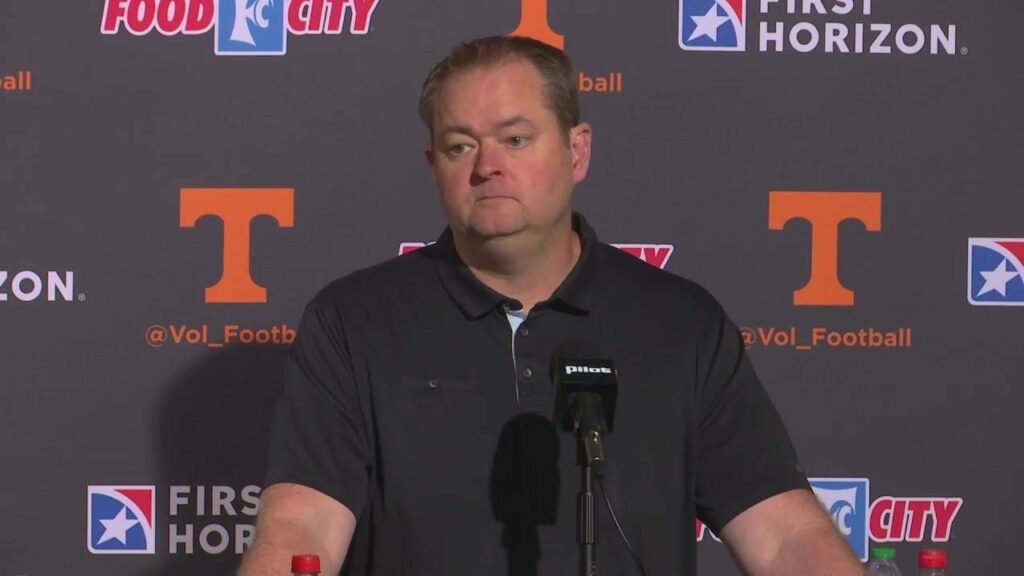
Josh Heupel Fired as Head Coach of Tennessee Football Following Disappointing 2025 Season
On a crisp morning in Knoxville, Tennessee, the once optimistic future of the University of Tennessee Volunteers football program turned into an era of uncertainty. Josh Heupel, who had been hired as the head coach in 2021 with hopes of returning the program to national prominence, was dismissed as head coach following a disappointing 2025 season. After a year filled with underperformance, internal strife, and missed expectations, Tennessee Athletic Director Danny White made the difficult but necessary decision to part ways with Heupel. The decision marks the end of an era for Heupel at Tennessee and leaves the Vols searching for a new leader to guide them forward.
Heupel’s Arrival at Tennessee
When Josh Heupel was hired by Tennessee in January 2021, it was a decision that seemed to align with the program’s need for an offensive revolution. The former Oklahoma quarterback and offensive mastermind was coming off a successful stint as the head coach at the University of Central Florida (UCF), where he transformed the program into a perennial contender in the American Athletic Conference. His innovative, up-tempo offense had caught the attention of the college football world, and Tennessee, a storied program with a rich history, seemed poised for a rejuvenation under his leadership.
Tennessee had been stuck in mediocrity for years, struggling to reclaim the glory of its past under coaches such as Phillip Fulmer and Lane Kiffin. The Vols hadn’t won an SEC title since 1998 and had fallen far behind the likes of Alabama, Georgia, and LSU. When Heupel took over, there was a palpable sense of optimism surrounding the program. He was viewed as a coach who could inject the program with new life, reignite the fan base, and potentially lead Tennessee back to national prominence.
Heupel’s initial years in Knoxville were mixed but promising. In 2021, Tennessee showed some flashes of brilliance, finishing with a 7-6 record, but the team also suffered some growing pains as Heupel implemented his high-powered offense. The following season, 2022, Heupel’s squad began to show the true potential of his system, with star quarterback Hendon Hooker leading the team to an 11-2 record and a victory in the Citrus Bowl. Tennessee’s offense became one of the most dangerous in the nation, and the program’s trajectory appeared to be heading in the right direction.
However, the 2023 and 2024 seasons proved to be more challenging. While Tennessee still had a potent offense, their defense struggled to keep up with the firepower of other SEC juggernauts, particularly Georgia, Alabama, and LSU. The Vols’ defense became a point of concern, and though they had the potential to compete in the conference, they often came up short in critical games. Despite Heupel’s best efforts, the program had not yet found the consistency needed to challenge for the SEC title, and the pressure began to mount.
The 2025 Season: A Step Back
Heading into the 2025 season, expectations were high for Tennessee. With a talented roster, including Heupel’s star quarterback, sophomore Ethan Reynolds, and a solid recruiting class, many experts believed this could be the year the Vols made a serious run at the SEC championship. However, the season began to unravel quickly, and what was once seen as a promising campaign turned into a nightmare for Heupel and the Tennessee program.
Tennessee’s 2025 season started with an easy win against an overmatched opponent in Week 1, but things began to go downhill rapidly in the following weeks. The team lost close games against Kentucky and Florida, both of which were winnable contests, but a lack of execution and poor decision-making on both sides of the ball led to heartbreaking defeats. The offense, which had been one of the most potent in the nation in previous seasons, struggled to find rhythm. Reynolds, once touted as a future star, faced growing pains in his development, often appearing out of sync with his receivers and failing to take full advantage of Heupel’s fast-paced offensive scheme.
More concerning, however, was Tennessee’s defense, which had been an ongoing issue since Heupel’s arrival. The Vols’ defense gave up huge chunks of yardage in crucial moments and struggled to stop high-powered offenses in the SEC. In a conference known for its physicality and dominance, Tennessee’s inability to stop opponents’ offenses became a fatal flaw. Despite Heupel’s offensive acumen, the lack of balance in the program was evident.
The most devastating loss came in late October, when Tennessee suffered a humiliating defeat to rival Alabama. The Vols were completely outmatched, and the 45-10 blowout served as a turning point in the season. Fans began to question Heupel’s ability to win big games, and the whispers of discontent grew louder. The team’s struggles only compounded from there, with losses to Arkansas and LSU before a disheartening defeat at home to an unranked Vanderbilt team. At 4-6 with only two games left in the regular season, the Vols were facing the very real prospect of missing out on a bowl game entirely.
Internal Struggles and Frustration
As the losses mounted, internal tension within the program began to grow. Heupel’s typically positive and calm demeanor was starting to crack under the pressure. Reports emerged of strained relationships between Heupel and some of his assistant coaches, particularly on the defensive side of the ball. Defensive coordinator Tim Banks, who had been with Heupel since his UCF days, came under fire for the team’s defensive inefficiencies, but Heupel was hesitant to make a change. There was also growing concern about Heupel’s reluctance to adjust his offensive system to better complement the defensive struggles, further alienating fans and boosters who were becoming frustrated with his stubbornness.
Behind the scenes, some players began to voice their displeasure with Heupel’s leadership, particularly with the lack of discipline and structure within the program. Though Heupel was well-liked by many of his players, there were growing concerns about his ability to hold players accountable and get the best out of them when it mattered most. These concerns became more apparent as the team continued to underperform in high-stakes games, leading to fractured morale in the locker room.
As the season wore on, the once-hopeful Volunteers began to look disjointed and undisciplined. Despite the high-powered offense that had been so effective in previous years, the team lacked the cohesion to compete with the elite programs of the SEC. The defense remained porous, the offense inconsistent, and the special teams unit failed to make any meaningful contributions. By mid-November, with a 5-7 record and no chance of qualifying for a bowl game, the Tennessee athletic department knew that a change was imminent.
The Decision to Fire Heupel
In the wake of Tennessee’s failure to qualify for a bowl game and the mounting frustrations within the fanbase, Danny White, the athletic director, made the difficult decision to fire Josh Heupel. In a statement released by the university, White expressed his appreciation for Heupel’s efforts and the progress he made in rebuilding the program in his early years but acknowledged that the 2025 season had fallen well short of expectations.
“Josh Heupel is a tremendous coach and has worked tirelessly to build this program. However, after much reflection, we have determined that a change is necessary for the future of Tennessee football. Our fans, alumni, and student-athletes deserve a program that competes at the highest level, and we believe that a new direction is required to return Tennessee to its rightful place among college football’s elite programs,” White said in the statement.
The decision to part ways with Heupel was met with mixed reactions. While some fans and pundits understood the rationale, others were disappointed that the program had not been given more time to develop under Heupel’s leadership. Tennessee had shown flashes of brilliance during Heupel’s tenure, but ultimately, the lack of sustained success in the SEC and the team’s inability to challenge for championships left the administration with little choice.
The Aftermath and Future of Tennessee Football
Heupel’s firing sent shockwaves through the college football landscape. As one of the brightest offensive minds in the game, Heupel’s departure raised questions about the future direction of the Tennessee program. The university now faces a critical crossroads. Tennessee is a program rich in tradition and history, with a passionate fanbase and deep financial resources, but it is clear that the Vols need a coach who can bring consistent success, especially in the highly competitive SEC.
The search for Heupel’s replacement is already underway. Names such as former NFL head coach and current college assistant coach Eric Bieniemy, Cincinnati head coach Luke Fickell, and former Tennessee assistant and current South Carolina head coach Shane Beamer have been floated as potential candidates to take over the Vols. Whoever takes over will inherit a roster with talent but will need to make immediate improvements on defense while continuing to develop the offense.
While Josh Heupel’s tenure at Tennessee ultimately ended in disappointment, his time in Knoxville should not be forgotten entirely. He provided a glimpse of what Tennessee could be offensively, and his system has the potential to succeed at the highest level with the right adjustments. Heupel may have ultimately been a victim of unrealistic expectations in a high-pressure environment, but the foundation he laid will be important for the next coach who steps into the position.
In the end, the firing of Josh Heupel marks a new chapter in Tennessee football. The Vols’ search for a new head coach will define the next era of the program and determine whether Tennessee can finally return to the upper echelon of college football, where it belongs.





